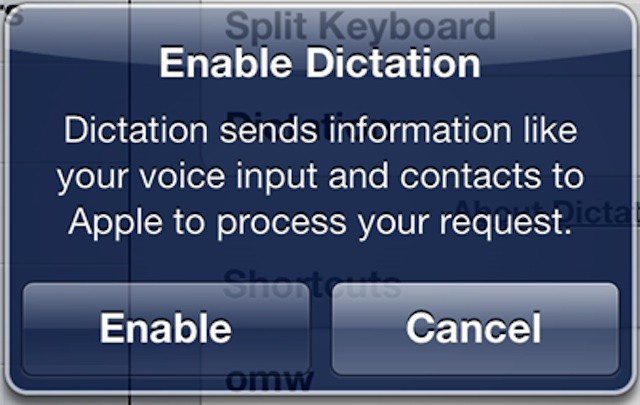One of the feature on the new iPad is its dictation capabilities, a feature also available on the iPhone 4S (which also boasts Apple’s Siri virtual assistant feature). There are quite a few ways that high quality dictation and other speech to text capabilities could useful to professionals in many fields.
The problem is that in order to get that high quality dictation functionality, the new iPad and the iPhone 4S rely on Apple’s servers to do much of the work in turning your speech into text. More importantly, it isn’t just snippets of voice recordings that get sent to Apple. Personal data from your iPad or iPhone 4S gets uploaded as well and much of it remains associated with you and your device. That’s a general concern for most of us, but for professionals in regulated industries like healthcare or fields that require confidentiality like finance and legal professions, it becomes a critical privacy concern and may even break the law.
There are serious advantages for Apple doing speech to text processing in its data centers rather than in iOS on a mobile device. The biggest advantage is processing power. There’s no way an iPad or iPhone, no matter how advanced, will ever come close to that sheer computational ability. The arrangement also has another big advantage. It let’s Apple crowd source the speech samples of millions of users. Analyzing those samples let’s the system evolve and improve and become more accurate over time, particularly for different dialects and regional speech habits.
In addition to speech samples, however, enabling dictation or Siri involves uploading more than just what you say. The dictation terms that you agree to when you turn on the feature state pretty clearly that your iPad or iPhone will upload personal data including your contacts, your relationships to your contacts (things like husband, mother, boss and so on), and the names of songs in your music collection – things that remain tied to you and your device.
Those terms also say that your personal data will be deleted if you turn of the feature but that some of your voice recordings may be kept on file along with transcripts and diagnostic data about your device (including its hardware and iOS version), though they’ll be dissociated from identifying information about you.
From the point of view of Siri, it’s pretty obvious that Apple uses this personal data to translate something like “call mom” or “play some jazz” into actionable commands. That the new iPad includes this data in its terms probably means that it’s just a matter of time before Apple releases an update that enables Siri.
Regardless of the personal details, even using dictation can violate privacy laws and regulations and even just company policies. Ironically, this makes the feature a no-go for some professionals where it be a perfect solution like healthcare. A doctor dictating notes about a patient’s condition using a system that sends those notes off to Apple would easily violate HIPPA as well as some rules around Medicare/Medicaid reimbursement. That would be a violation in itself but it’s even worse if Apple might hang on to that data.
Unfortunately, there’s no easy way around this fact. If you work in a regulated industry or field where privacy policies need to be enforced, Apple’s dictation solution isn’t going to cut it. Even if you don’t work in such a field, the idea of business and device data residing on Apple’s servers indefinitely is still something that should give you pause when deciding whether or not to use dictation or Sire.


